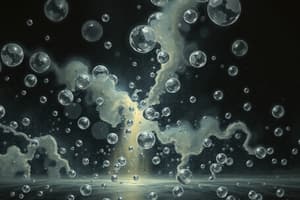Podcast
Questions and Answers
What is the most basic level of matter?
What is the most basic level of matter?
- Atoms (correct)
- Elements
- Molecules
- Compounds
Who is credited with developing the periodic table?
Who is credited with developing the periodic table?
- Albert Einstein
- Marie Curie
- Isaac Newton
- Dmitri Mendeleev (correct)
What are substances that cannot be broken down through ordinary chemical reactions?
What are substances that cannot be broken down through ordinary chemical reactions?
- Molecules
- Elements (correct)
- Atoms
- Compounds
In chemistry, what forms when atoms bond together?
In chemistry, what forms when atoms bond together?
What is water (H2O) classified as in chemistry?
What is water (H2O) classified as in chemistry?
What is the purpose of balancing chemical equations?
What is the purpose of balancing chemical equations?
How is the strength of an acid or base determined?
How is the strength of an acid or base determined?
What does Le Chatelier's principle help predict in chemical systems?
What does Le Chatelier's principle help predict in chemical systems?
Which law of thermodynamics describes how energy transformations result in an increase in entropy?
Which law of thermodynamics describes how energy transformations result in an increase in entropy?
What determines the rate of a chemical reaction according to the text?
What determines the rate of a chemical reaction according to the text?
Study Notes
Exploring the Fascinating World of Chemistry
Chemistry is a captivating field that delves deep into the composition, properties, and interactions of matter. It's a journey through the building blocks of our world and the transformations they undergo. Let's unpack some fundamental concepts and subtopics that help us understand this vast and dynamic field.
The Science of Matter
Chemistry focuses on the study of matter, which encompasses everything we can touch, see, and feel. At the most basic level, matter is made up of individual atoms, which are the smallest units of an element. Elements are substances that cannot be broken down through ordinary chemical reactions into simpler substances.
When atoms bond together, they form molecules, which are the building blocks of compounds. Compounds are substances made up of two or more different elements chemically bound together. For example, water (H2O) is a compound composed of hydrogen and oxygen atoms.
The Periodic Table
The periodic table, developed by Russian chemist Dmitri Mendeleev, organizes elements by their atomic numbers, chemical properties, and behaviors. This organization helps chemists predict and understand the behavior of elements in various chemical reactions. Chemistry students learn to use the periodic table to identify elements and their properties, as well as to understand trends in element behavior.
Chemical Reactions
Chemical reactions are transformations of matter from one form to another. For a reaction to occur, reactants must be present, and the temperature, pressure, and concentration must be appropriate. Reactants combine to form products, and energy may be released or absorbed in the process.
Chemical reactions can be classified as synthesis (combination), decomposition, single replacement (displacement), or double replacement, depending on the types of interactions and the substances involved.
Balancing Chemical Equations
Balancing chemical equations is an essential skill in chemistry. Balanced equations show the ratio of atoms and molecules involved in a reaction. Balancing equations helps chemists predict the stoichiometry (ratio of reactants and products) and the amount of products that can be produced from a certain amount of reactants.
Acids, Bases, and pH
Chemistry also deals with acids and bases, which interact to form salts and water. The strength of an acid or base is determined by its ability to donate or accept hydrogen ions (H+). The pH scale measures the acidity or alkalinity of a solution, with lower pH values indicating acidic solutions and higher pH values indicating basic solutions.
Reaction Rates and Equilibrium
Chemical reactions don't always proceed at the same rate. Reaction rates depend on factors such as temperature, concentration, and the presence of a catalyst. Chemical equilibrium is a state in which the rate of a forward reaction is equal to the rate of a reverse reaction. Le Chatelier's principle helps chemists predict how systems will respond to changes in temperature, concentration, or pressure.
Energy and Thermodynamics
Chemistry also involves the study of energy and thermodynamics, which deals with energy transfers and transformations in chemical reactions. The first law of thermodynamics states that energy cannot be created or destroyed, but can be transformed or transferred. The second law of thermodynamics describes how energy transformations result in an increase in entropy (disorder).
In conclusion, chemistry is an exciting field that explores the composition, properties, and interactions of matter. By understanding the basic concepts and subtopics outlined above, students and enthusiasts can delve deeper into the fascinating world of chemistry.
Studying That Suits You
Use AI to generate personalized quizzes and flashcards to suit your learning preferences.
Description
Dive into the captivating world of chemistry with this quiz covering fundamental concepts such as matter, the periodic table, chemical reactions, balancing equations, acids and bases, reaction rates, equilibrium, and energy thermodynamics. Enhance your understanding of the building blocks of our world and the transformations they undergo.




